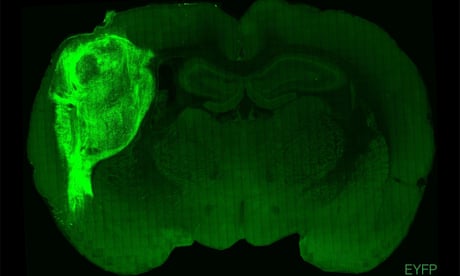Researchers have transplanted human neurons into rat brains in work that aims to shed fresh light on debilitating neurological and psychiatric disorders such as epilepsy and schizophrenia. The clumps of human cells took root inside the animal brains, hooked up to their blood supplies and tapped into rat brain circuits, allowing them to sense whisker movements and change how the animals behaved. The groundbreaking procedure means scientists can now study how brain cells from patients with neuropsychiatric disorders malfunction in a living brain, and assess the impact of drugs in real time.
“Psychiatric disorders are a huge burden on society and it is very, very clear that we need better models for studying them,” said Sergiu Pasca, a professor of psychiatry who led the research at Stanford University. “We see patients and patients’ families that are desperate. There is no time to waste.
” The work is the latest advance in the ethically complex field of brain organoids, in which scientists grow tiny balls of human brain cells in the laboratory. Researchers have used organoids to probe brain development, autism, and the impact of infections such as Zika virus, but some have asked how scientists will know if organoids ever reach a point that they suffer or become conscious . One practical issue facing the field is that lumps of brain tissue grown in the lab behave differently to neurons in the brain.
Part of the problem is that organoids are not bathed in nutrients from a blood supply and not wired into the broader brain circuitry. To overcome these latter problems, Pasca and his colleagues grew human brain organoids in a dish until they comprised between 500,000 and 1m neurons. The 1.
5mm-wide balls of tissue were then transplanted into newborn rat brains, specifically a region called the somatosensory cortex, which processes tactile sensations such as whisker movement. Five months later, MRI scans showed that the clumps of human brain tissue had grown six to eight times larger and hooked up to the animal’s blood supply. The human brain cells did not replace rat brain tissue but instead wired into it.
Once grown, each organoid added about 5m human neurons to the rat’s 30m. Some rats received two organoids, one on each side of the brain. Tests on the animals found no evidence that they performed any better, or suffered ill-effects.
But the human neurons flickered with activity when air was blown across the rats’ whiskers, showing a melding between rat and human brain tissue. The scientists later trained the rats to expect a drink of water when the human cells in their brains were activated, showing that the human cells could affect the rats’ behaviour. To show how the procedure could be valuable for research, the scientists created brain organoids from healthy human cells and others from patients with a genetic disorder called Timothy syndrome and transplanted them into rat brains.
The patients’ brain organoids grew to the point that they exhibited clear abnormalities. Details are published in Nature . The team intends to study a range of conditions from epilepsy and schizophrenia to specific forms of autism, alongside drugs that might help some patients.
Gabriele Lignani at UCL’s Institute of Neurology said the work was “exciting” and opened new avenues to study neuropsychiatric diseases. “The combination of human cells with a full-body animal model overcomes limitations that these models have by their own,” he added. Hank Greely, the director of the Center for Law and the Biosciences at Stanford University, who advised on the study, said organoid research raises a number of ethical issues.
“What if the organoid has some kind of consciousness and it suffers as a result of the transplant? Or what if the transplanted animal takes on “human” characteristics?” he said. Greely does not believe these are problems today, but considers them worth discussing as the work advances. “It is not too early to think about how we could try to determine ‘society’s’ answer, if that day arrives,” he said.
.
From: theguardian
URL: https://www.theguardian.com/science/2022/oct/12/human-neurons-transplanted-into-rats-to-help-study-brain-disorders



